- Home
- A. S. Byatt
Sugar and Other Stories Page 17
Sugar and Other Stories Read online
Page 17
Henry Smee and Josephine sat in front of the kitchen stove, drinking powdered coffee. Henry was eating an apple, a Cox’s Orange Pippin, which Josephine had given him. He looked as though the sound his teeth made, driving through the crackling apple-flesh, distressed or embarrassed him in the silence. He sat on a bench, his knees tight together, his thin ankles in his slippers whitely together. When he was not eating he held his hands together, pointing downwards, between his knees. Josephine wanted to be in bed. She, like Henry, suffered from insomnia, but she would rather have been reading. At three in the morning she fended off fear with long narrative poems, at once difficult verbally and offering another imagined world to enter. She asked Henry how his work was going at the library and he replied that their classification system was crazy and made a lot of unnecessary work: they think books are just things of a certain size, said Henry.
And then he said, “I read The Boiler-Room.”
“Ah yes.”
“Max told me to read it and I read it.”
“Good.”
“Simon Vowle.” said Henry, and stopped. “Simon Vowle.” It was a terrible effort for him. He was shaking. His coffee cup shook and he had to put it down. Josephine, who might have taken pleasure in writing about the pain it was for him to make any direct communication, nevertheless made no effort to help him.
“How do you know about Simon Vowle? He — he does little — intimate things — plays little games with himself — you know, naturally, why am I telling you? — that I thought only I knew about. I thought only I —”
Josephine was more than reluctant to embark on this conversation. She answered, flippantly for her, “I know by observation. It’s not uncommon. People grow out of it.”
“Oh no,” said Henry Smee. His glasses were steamed up. He took them off and turned to her a blind, seeking, vulnerable face. “The world is more terrible than most people ever let themselves imagine. Isn’t it?”
She should have asked him, what are you afraid of? She was afraid of him. She said, wilfully, “Surely not at St Edmund’s, with people like Max? I sent my Peter there because it was such a friendly place.”
“It isn’t —” He twisted his useless hands in his dressing-gown. “It isn’t — friendly to everyone. It isn’t possible. They are impossible people.”
“I’m very fond of Max,” said Josephine’s respectable voice.
“I wasn’t happy.”
“You will grow out of it. We all have to.”
“Oh no. You don’t — understand. No — you do — you wrote — You won’t understand.”
“I get tired at three in the morning.”
“Of course. I’ll go to bed. Of course.”
He rose jerkily and made off, a shuffle, a tentative stepping. Max had sent him to her for help. She had not helped. She put his apple core in the bin and wiped and wiped her softly shining table top.
After this, she became continuously afraid of Henry Smee. When she was working she listened for his quiet tread in her house, when she was cooking she waited for him to slide round the door and stand uselessly erect just inside it, waiting for something or nothing defined. She felt above all threatened by his reading of Simon Vowle. Simon Vowle was herself, was Josephine Piper: there was no room for another. Writers are commonly asked what reader they imagine. There are writers, believe it, and Josephine Piper was one of them, who can only function by imagining no reader. Simon was her own fear, circumscribed and set up independently. Henry’s presence in her house, reading Simon and, terrible phrase, but here for once peculiarly apposite, “identifying with” Simon, was a blow at her own carefully created, carefully worked, independent identity. She developed, for the first time in her busy life, a writer’s block. All the people she invented had Henry Smee’s face, his nervous mannerisms, his soft scornful-frightened voice. Her freedom had gone, the freedom with which she had imaginatively looked out from inside the other skull of Simon Vowle, seeing the other boiler-room, the different coke-heap, smelling through his nostrils the fustiness and bitterness.
Josephine was her own creation, as was separate Simon, as were the troop of other precursors and avatars of Simon. Josephine had made herself, with an effort of will, in opposition to her mother’s fear, and what that might have made of her. She had said to herself, there will be a warm, friendly house, people shall come freely in and out, they will be made welcome amongst nice things. The warm and welcoming place, which now existed, was not, she knew, a true expression of herself. It was what she knew must be. What she was, was the obsessive hider in the boiler-room dust. Her husband, Peter’s father, after five years of living in the warm place, eating the good food, had left her for a sillier, more slapdash woman, who did little or nothing with her time, who laughed a lot. People had asked each other, and had even asked Josephine, how he could do this. Josephine did not ask herself. She knew. He had found her out. She did not mind the loss of him too much. A strain had gone, as well as a motive for living. She had had Peter still. She made a home for Peter.
Peter had been so cheerful. So outgoing. Even as a little boy he ran fearlessly up to people on buses or railway stations. He brought friends home, one after the other, and seemed in no doubt that they would go home well-fed and well-entertained. She had had her guard up: had never let him see or sense her fear. She had talked to Peter, only ever really to Peter. He had become so involved in the selection and entertainment of the Lost Boys. She had perhaps not noticed that he had other fears. He did not have the uncompromising intellect of Josephine and Henry Smee. Exams were hard for him: he struggled to become qualified and went off to do a course, carefully selected by him and Josephine as “human”, in Communications at a polytechnic in a southern port. It was not until it had been going on for some months that Josephine learned that he was attending no classes, and then not from him. He spent all his time helping a group who brought soup to ragged sleepers in parks and subways, who helped squatters to break into empty council flats or bourgeois houses, who were not above taking what they saw as necessities from supermarkets. Josephine went to see him once: he was living in a squat himself, long-bearded in layers of holed and smelly sweaters and cardigans. Josephine said “Why?” and Peter simply smiled pleasantly and told her he was happy enough. As though something was self-evident that to Josephine was not self-evident at all. He seemed unnaturally easy — easy-going, his body shambling and over-relaxed. Was this a new form of fear? Were the meths drinkers the logical culmination of the Lost Boys? Had he, later than his father, sensed that it was all made up, the warm firelight, the clean clothes, the open door, the smell of cooking? He smelled, her son, of old drains, of dirty wool, of damp ashes. Josephine blamed herself, but without her usual clarity about how and where precisely she had done wrong. Perhaps she had not done wrong. She simply was wrong.
Her bedroom was hers in a way the rest of the house was not. It was a small cell. She had moved calmly out of the conjugal master bedroom to what had been a servant’s small box, next to what might have been the nursery, a place where a nurserymaid might have heard crying in the night and come. She had her old childhood bed, with cast iron head and foot, a small chest with a mirror over it, a table with a reading lamp, a peg rug on polished boards. She had not even a bookcase — books were brought in and out of this little place, but their soft colours brightened other walls. One night, perhaps a week after Henry Smee had brought himself to try to speak of Simon Vowle, and had been discouraged, she came home from a dinner and listened fearfully at the foot of the stair, as the mini-cab drove away, for Henry Smee’s inexorable tentative tread. The kitchen was dark and empty, the stove cold. She went up, sighed, closed herself into her small room and began to scream. He was doing nothing very fearful: simply studying his own face, sitting on the end of her bed, in her square of mirror, in the light given by the street lamp. As she came in what she in fact saw was his reflected image staring at her out of the square of dark glass, lit up oddly by the light from the landing, through t
he door over her own shoulder. One of her drawers was slightly open, as though he might have been seeking out gloves or stockings, trying them on for fit, though this was entirely in her imagination, this trying-on, this appropriation. The only evidence was the open drawer, and she might have left that herself, in a hurry to leave. It was unlike her, particularly in here, but she might. His moon-face in the glass was distraught and glittering, eyeless because his glasses reflected reflection. His mouth was open in a great cry, but he made no sound. All the sound was her own screaming. He was white, and she thought again, he has taken my make-up: there was a faint smell of eau de Cologne and violets. But the white was surely his natural whiteness, the Simon Vowle paleness she had used to such good effect, lit up by the sodium lighting in the street.
“Get out,” shrieked Josephine Piper, losing the self-control which, with the rhythm of her sentences, was what she most prized in herself, “get out, get out of my house, I can’t bear any more of this, I can’t bear your creeping, get out of my house now this minute or anyway tomorrow.”
He closed his mouth, then, and smiled a small circumscribed and satisfied little smile.
“Of course,” he said. “Now this minute or tomorrow, of course I’ll get out.”
“It was shock,” said Josephine as he edged round her. “Only shock.”
“Don’t mention it,” said Henry Smee.
He went, the next day. She did not try to stop him. In a month or two Max McKinley rang to break it to her, which he did with circumspection and tact, that Henry Smee was dead, that he had swallowed a bottle of aspirin, just before he was due to take up his place at university. For a moment Josephine’s imagination presented Henry Smee to her, as though there still was a Henry Smee, the pale creeping, the compressed mouth, the thin legs in drooping trousers, the outside of Henry Smee whose inside was unknown and unimagined. Whose inside she had refused to imagine. But Josephine could not go on, quite apart from feeling that it was indecent to go on, to imagine the making of the decision, the number of aspirins, the waiting. Her imagination tidied Henry Smee into a mnemonic, a barely specified bed, a barely specified bottle, a form with one outflung arm. She said to Max McKinley, “I didn’t know, I never got a sense of what drove him, he was so closed-in, how terrible.” And Max said, “We failed him, we all failed him.” And Josephine agreed.
But the writing-block went. The next day she was able to start again with nothing and no one between her and the present Simon Vowle, a writer at work, making a separate world, with no inconvenient reader or importunate character in the house. The ghost of those limp yet skilful hands, just that, attached itself to the form of the present Simon (whose name was in fact James) but not so that anyone would have noticed.
IN THE AIR
“The mean sea-level pressure at Brize Norton was one thousand and twelve millibars, steady. The outlook for Thursday; sun and showers, some of them heavy, with the chance of thundery outbreaks in places. Thank you for calling.”
Mrs Sugden put down the telephone reluctantly. Today’s voice was the reassuring good schoolmistress, her favourite. She preferred the female voices, which included also the breathy young thing in a hurry and a slightly doleful Midland bus-conductress type. The men included a military rasper, a stumbling student and a cheeky Liverpudlian who enjoyed frightening her with hail and gales, who livened up perceptibly with prophecies of disaster. Sometimes, shamefully, she listened to the schoolmistress twice, for company, although her memory was not failing and she had taken in all the information the first time. It was shaming in the way her increased television-watching was shaming. In her schoolteaching days she had always urged the children not to sit passively in front of the box. Make your own lives, she had said, see real friends, do real things, your things. Now she saw the insidious pleasure of the company, the voices in the room. She watched a brilliant ribbon of gardening and death-dealing, skating, Shakespeare and endless news. She drew the line at chat shows. She hated compères who smiled at her, sucking her into the front row of their perpetual stalls, or invading her private space with their horribly public intimacies and preening. Voices was one thing, false friends another. Those were the real fantasies.
Wolfgang came out of the kitchen, with rattling nails and serpentining, butt-waving body. After the weather-call, the walk. Wolfgang knew that. He opened his mouth in his paradoxical yawn of excitement, and a thin, tense creaking came out of his throat.
Mrs Sugden wondered whether this was good or bad weather for the man to come out in. His work — she thought of it as his work — must be much more pleasant in dry, clear weather. On the other hand, on that sort of day, there were more people about. The Common must be quite marshy after all the rain there’d been. Mrs Sugden had become a walking barometer. Her hip joints knew when the temperature or the pressure was about to drop. Her sinuses ached as the clouds closed, before the clouds closed. A kind of lightning-conductor ran down her thickened neck into the pads of her shoulders and down her upper arms. I have my health, that’s the main thing, she told people, James and Alison when they telephoned, the Boot’s pharmacist, the woman from the flat opposite, whom Mrs Sugden could not like, because she stank of tobacco, and, more shamingly, because she was London and raucous, which Mrs Sugden, though she had lived in London most of her sixty-three years, was not. But having one’s health didn’t mean that one didn’t daily notice one’s body more, as a nuisance, that was, as an impediment, not as the springing thing it had once been. There were things between it and the outer world, like the horny doors she had observed in childhood on hibernating snails. She didn’t see so far or focus so fast. She noticed her hips, on the Common, and had to make a real moral effort to see the hooded crow, or the hovering kestrel.
“What do you think he’ll do today?” she asked Wolfgang, who abased himself, grinning and pleading. “Where will he think is a good place?”
She reviewed the likely ones, as she did daily. The underpass smelled of recently stale urine and had dark puddles in it. A nasty place she’d keep out of, if she were him, but she wasn’t him, that was the point, he might like the dark, or even the smell. There was the little wood by the pond, where every bush had its spiked decorations of crisp packets and cola tins and fading pastel tissues. That was a place she was sure he would like. There were also the earth works, and the rhododendrons round the pond.
Once, in the wood, someone who might have been the man had cycled very slowly past her. It might have been noon, on a good day: Wolfgang was foraging in brambles. He had cycled so slowly he had wobbled, and had looked straight at her, noticing, she thought, her fear. He was a huge man, in a singlet, and jeans, and working boots, with greying curly hair and a yellowish, yellow-clay skin. She had brought her whistle smartly out of her pocket and called Wolfgang. The whistle was a relic of playground duty: with it she had quelled gang-bashings and started netball matches. Its dried pea quavered tremulously in its throat and Wolfgang bounded up. The man went on, but was back, crossing her in the other direction, with a hard stare, before she was out of the wood. He knew she was afraid, and liked the knowledge. It went no further than that. She stumped slowly on in her zipped boots. The man did not acquire the features of the cyclist, but remained a shape-changer. He was black, he was white, he was brown, he was dirty grey, he was a thin youth with acne or an ageing bullet-headed stroller in leather jacket and trainers. He carried a briefcase, a plastic bag of junk from rubbish bins, a knife. He had all the time in the world, unlike Mrs Sugden, whose eventless days slipped into each other like nylon thread through a chain of enamelled television-beads. Every day she feared him a little more, every day the mental encounter took another step into the vividly realized. Mrs Sugden, a sensible woman, knew he was an obsession, but she did not know how to exorcize him. Yesterday’s local paper carried an account of a rugger-tackled, abused female jogger (48) in the Park, and a raped teenager (15) in the concrete waste land behind the local supermarket. Why should he not wait for, or at the least, acciden
tally notice her too?

 The Children's Book
The Children's Book Babel Tower
Babel Tower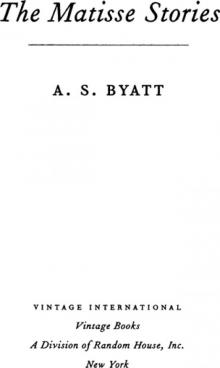 The Matisse Stories
The Matisse Stories Peacock & Vine: On William Morris and Mariano Fortuny
Peacock & Vine: On William Morris and Mariano Fortuny Elementals: Stories of Fire and Ice
Elementals: Stories of Fire and Ice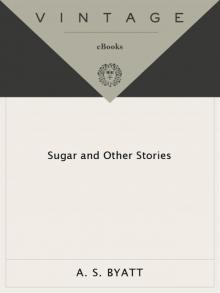 Sugar and Other Stories
Sugar and Other Stories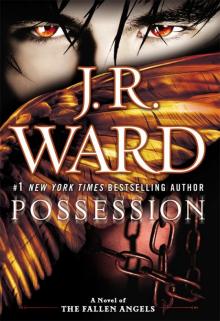 Possession
Possession Little Black Book of Stories
Little Black Book of Stories The Djinn in the Nightingale's Eye
The Djinn in the Nightingale's Eye The Virgin in the Garden
The Virgin in the Garden The Game
The Game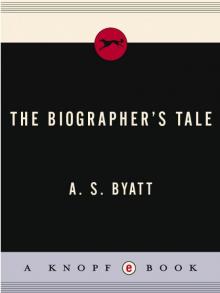 The Biographer's Tale
The Biographer's Tale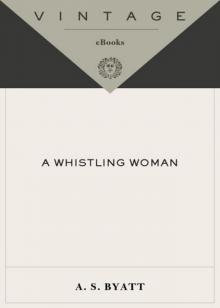 A Whistling Woman
A Whistling Woman Ragnarok
Ragnarok Angels & Insects: Two Novellas
Angels & Insects: Two Novellas Ragnarok: the End of the Gods (Myths)
Ragnarok: the End of the Gods (Myths) Peacock & Vine
Peacock & Vine The Djinn in the Nightingale's Eye (Vintage International)
The Djinn in the Nightingale's Eye (Vintage International) Angels and Insects
Angels and Insects The Arabian Nights: Tales from a Thousand and One Nights (Modern Library Classics)
The Arabian Nights: Tales from a Thousand and One Nights (Modern Library Classics) Elementals
Elementals